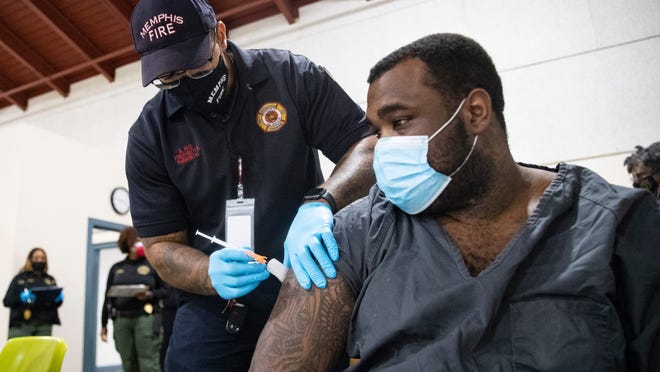
Pharmaceutical companies Merck & Co. and Ridgeback Biotherapeutics announced Monday the submission of emergency use authorization to the Food and Drug Administration for molnupiravir, an antiviral drug that offers the promise that COVID-19 could soon be treated by a pill.
Molnupiravir, an orally ingested antiviral pill, is used to treat mild to moderate adult cases of COVID-19 that are at risk of worsening to severe COVID-19 or hospitalization, according to the companies. It was created by researchers at Emory University in Atlanta and is given as four pills taken twice a day for five days.
An interim analysis from a clinical trial found the antiviral medicine reduced the risk of hospitalization or death by approximately 50%.
Since early in the pandemic, public health officials have hoped for effective antivirals that could help prevent severe infection in people exposed to the SARS-CoV-2 virus. Several existing drugs were tested against the virus early on but shown to have no benefit for patients.
In June, the Biden administration allocated $3.2 billion toward the development of an antiviral, saying the drugs would be a crucial part of the fight against the virus.
If the medicine is approved for emergency use authorization, Merck says it will supply about 1.7 million doses of molnupiravir to the U.S. government for distribution.
Also in the news:
► COVID-19 infection rates fell about 12% last week compared with the week before, and hospitalizations dropped 14%, Centers for Disease Control and Prevention Director Dr. Rochelle Walensky said.
►The most recent suspected COVID-19 outbreak at a zoo is at the Great Plains Zoo in Sioux Falls. The zoo announced that one of its Amur tigers had tested positive for COVID-19 on Thursday. Other big cats were taken off display and tested after showing symptoms.
►Nevada this week became one of the last states to publicly report rapid antigen tests as part of its coronavirus tallies. Maryland remains the lone U.S. state that doesn't incorporate rapid tests in its online dashboard or include them in virus statistics.
📈Today's numbers: The U.S. has recorded more than 44 million confirmed COVID-19 cases and more than 713,000 deaths, according to Johns Hopkins University data. Global totals: More than 237 million cases and 4.8 million deaths. More than 187 million Americans – 56.4% of the population – are fully vaccinated, according to the CDC.
📘What we're reading: For a time, the U.S. vaccine rollout was the envy of much of the world. Since then, the United States has become a global vaccine laggard, the percentage of its population inoculated lower than dozens of other nations. Supply isn’t the problem — a complicated and confounding lack of demand is to blame.
Keep refreshing this page for the latest news. Want more? Sign up for USA TODAY's Coronavirus Watch newsletter to receive updates directly to your inbox and join our Facebook group.
Parents eager to vaccinate their kids; pediatricians ask for patience
With an official application submitted last Thursday for the Pfizer-BioNTech COVID-19 vaccine, more than 28 million children could become eligible to receive the shot days after Halloween, and pediatricians and pharmacists are bracing for a crush.
But parents need to be prepared to wait a few days after the Food and Drug Administration gives its expected go-ahead, experts say, while the system gears up to give the new lower-dosage formulation for that age group.
“There is probably going to be a period of time where demand exceeds supply, very similar to what we saw in doses for adults back in December," said Dr. Shereef Elnahal, CEO of University Hospital in Newark, New Jersey.
– Elizabeth Weise, USA TODAY
Nearly 18% of new COVID infections in Arizona last month were 'breakthrough' cases
Breakthrough COVID-19 infections in Arizona rose to nearly 18% of new cases in September, but state health officials emphasize vaccination remains the best way to prevent serious illness and death.
Ever since the highly contagious delta variant took hold in the U.S. and Arizona in the early summer, rates of breakthrough COVID-19 infections have been climbing.
As of September, breakthrough infections made up 17.87% or about one in six new COVID-19 cases, according to data from the Arizona Department of Health Services.
– Stephanie Innes, Arizona Republic
In California, inconsistent school COVID rules are the norm
While California has a few statewide requirements for all schools, such as requiring all public and private school teachers and students to wear face masks indoors, and a vaccinate-or-test rule for teachers starting in mid-October, many other details are left to local school officials. That includes the who, when, where and how to test for COVID-19 and ever-shifting quarantine rules.
Some large urban districts such as Los Angeles, San Francisco and Oakland tell students to mask up for outdoor recess, while many others do not. Some schools have rigorous on-site mandatory COVID-19 testing programs, but many don’t.
Across the state, parents who want to see more testing are looking to the Los Angeles Unified School District – the nation’s second-largest – as a model. The state’s largest school district has an ambitious program that mandates weekly on-site testing for all 600,000 students and 75,000 employees.
“It’s crazy that a school district as huge as Los Angeles can pull it off, and we’re just twiddling our thumbs over here,” said Samantha Benton, a mother of two in Sacramento, where only voluntary testing is offered.
– Associated Press
Source link








